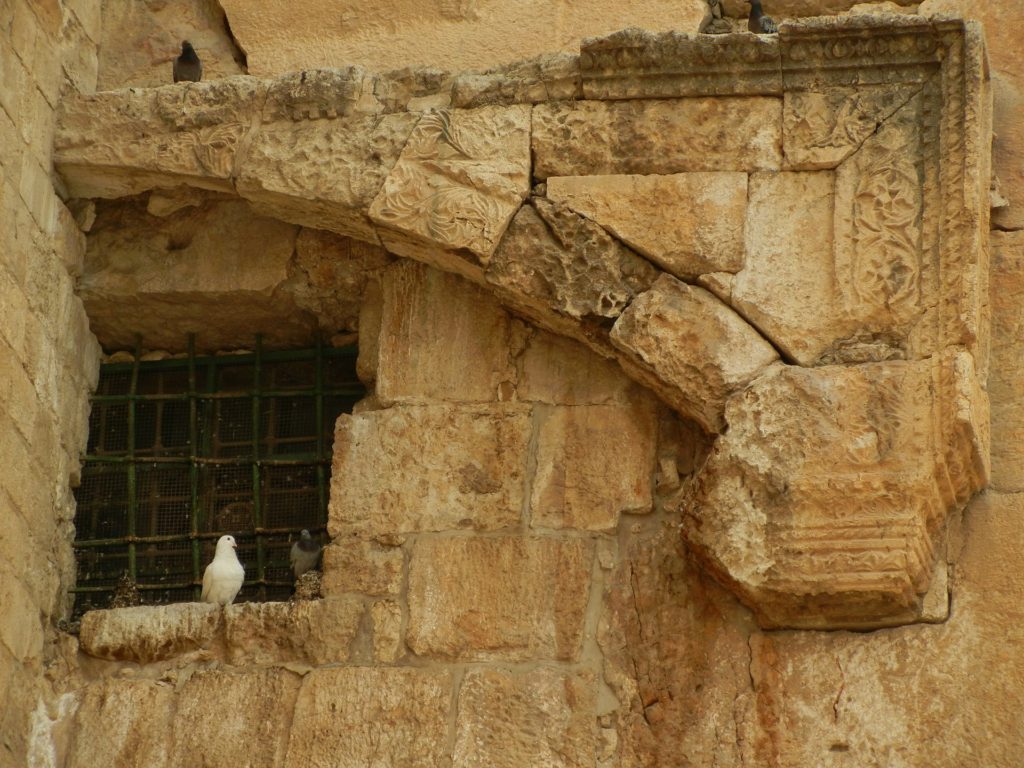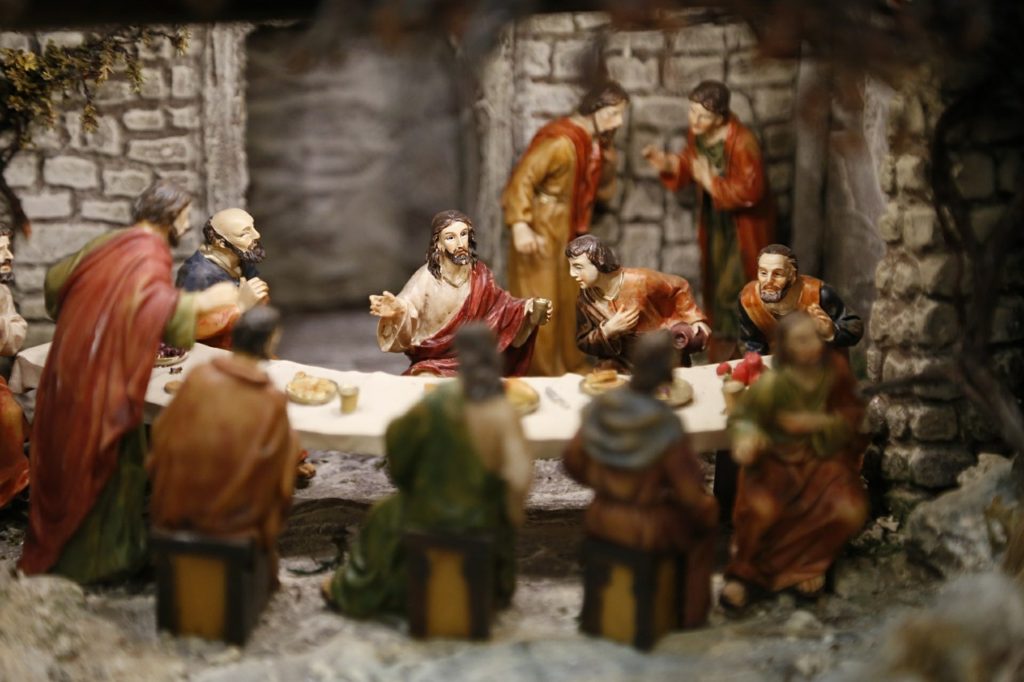Let’s explore the parable of New Cloth and New Wine. This is a parable that teaches us about embracing new traditions and ideas. Jesus brings us the new covenant. We must let go of the old and have a new perspective…
The Fasting Challenge
The parable New Cloth and New Wine is the result of an inquiry by the disciples of John the Baptist. John’s disciples were following the fasting traditions upheld by the Jewish Religious leaders. And they wanted to know why the disciples of Jesus were not.
Fasting was a common tradition and the Jewish religious leaders fasted regularly twice a week. They also fasted on specific Holidays and it was appropriate to fast as a form of mourning a loss. Fasting like this was an old and respected tradition among the Jewish leaders and now John’s disciples. The question of how seriously Jesus’s disciples took the beliefs was raised by the omission of this tradition.

Matthew 9:14-17 (KJV)
14 Then came to him the disciples of John, saying, Why do we and the Pharisees fast oft, but thy disciples fast not?
15 And Jesus said unto them, Can the children of the bridechamber mourn, as long as the bridegroom is with them? but the days will come, when the bridegroom shall be taken from them, and then shall they fast.
16 No man putteth a piece of new cloth unto an old garment, for that which is put in to fill it up taketh from the garment, and the rent is made worse.
17 Neither do men put new wine into old bottles: else the bottles break, and the wine runneth out, and the bottles perish: but they put new wine into new bottles, and both are preserved.
The Bridegroom
New Covenant, New Perspective
The Wedding Traditions
Understanding the traditions assists with interpretation of the parables message. In ancient Jewish Wedding customs the wedding was in three stages.
- Marriage bond or contract
- Consummation
- Celebration or wedding feast
In ancient Jewish weddings there was not a traditional wedding ceremony as we know it today. So it is important to know their traditions to understand the concept of the parables messages.
This parable refers to the third stage. The bride and groom in a great procession were led publicly to the celebration wedding feast. The feast took place at the home of the groom. Where they would feast and celebrate with the entire wedding party for a week. The grooms presence is a time of joy and celebration at the wedding feast. It was not the tradition of the grooms friends to fast while he was with them. But when the groom leaves them, that would be a time to mourn and fast.
The Bridegroom
In this example Jesus was introducing himself as the bridegroom and his presence was a time for rejoicing. Mourning was appropriate upon his departure. Fasting would be relevant at that time but not while he was among them. These new circumstances justified change. And a change in the usual traditions was not something to resist. They should embrace the joy of having him with them. And put away their fasting for the time of mourning…

Mark 2:18-22 (KJV)
18 And the disciples of John and of the Pharisees used to fast: and they come and say unto him, Why do the disciples of John and of the Pharisees fast, but thy disciples fast not?
19 And Jesus said unto them, Can the children of the bridechamber fast, while the bridegroom is with them? as long as they have the bridegroom with them, they cannot fast.
20 But the days will come, when the bridegroom shall be taken away from them, and then shall they fast in those days.
21 No man also seweth a piece of new cloth on an old garment: else the new piece that filled it up taketh away from the old, and the rent is made worse.
22 And no man putteth new wine into old bottles: else the new wine doth burst the bottles, and the wine is spilled, and the bottles will be marred: but new wine must be put into new bottles.
The New Cloth
New Covenant, New Perspective
To Combine is To Destroy
He tells them no one takes a new piece of cloth to repair an old garment. That in so doing the new cloth ultimately puts undue stress on the old fabric. This will result in destruction of the old garment.
Jesus was teaching messages that were rebellious to the traditional teachings of the Jewish Spiritual leaders. It was a radical break from the traditional opinions. He was trying to convey that it was necessary to break away from the old and embrace the new in its entirety. Combining the covenants was not possible.
The New Covenant
At the time Jesus was teaching the new covenant (through Christianity) to the people. He knew they were struggling with how to interpret what he was teaching against the old covenant (Mosaic Law) they lived by. Let go of the old traditions. And they had to start fresh in the new way. They must embrace the new teachings only.
Jesus knew that the new covenant with the son of God here on earth as a man was a joyous thing. This was wonderful news that man could have a close relationship with God. There was a savior of mankind. It was not a time of mourning but a time for celebration. He was teaching an embrace of salvation and eternal life. Not a time for fasting. Fasting was for sadness and mourning. And this certainly was not a sad occasion. It was a New Covenant, New Perspective…

Luke 5:33-39 (KJV)
33 And they said unto him, Why do the disciples of John fast often, and make prayers, and likewise the disciples of the Pharisees; but thine eat and drink?
34 And he said unto them, Can ye make the children of the bridechamber fast, while the bridegroom is with them?
35 But the days will come, when the bridegroom shall be taken away from them, and then shall they fast in those days.
36 And he spake also a parable unto them; No man putteth a piece of a new garment upon an old; if otherwise, then both the new maketh a rent, and the piece that was taken out of the new agreeth not with the old.
37 And no man putteth new wine into old bottles; else the new wine will burst the bottles, and be spilled, and the bottles shall perish.
38 But new wine must be put into new bottles; and both are preserved.
39 No man also having drunk old wine straightway desireth new: for he saith, The old is better.
The New Wine
New Covenant, New Perspective
Wine Bottles
To understand this parable we need to understand that the wine “bottles” they are referring to were animal skins. These skins would dry out and split or crack with age. So the idea of reuse was not feasible to a reasonable person. The use of them could result in leakage and the loss of the wine.
Jesus tells them no man should put new wine in old bottles. Or the wine will burst the new bottles and be spilled. But one should put new wine into new bottles to preserve it. However here he appears to address their resistance by saying no man who drinks the old wine prefers the new. Because the man says the old wine is better.
Break from the Old
The old covenant required the blood sacrifice of animals as atonement for the sin of man. But Jesus had come with a new message to teach them. Embrace a new covenant and leave the old behind. New Covenant, New Perspective…
But man will resist the new and cling to the old. He will be thinking it is better. Release the old and walk the new path to salvation…
There were such significant things taking place on earth in the time of Jesus. He was teaching crucial things that would impact the world in such a profound way. It was not a time to practice the old traditions as usual. Fasting was not suitable during such a joyous occasion. Jesus bringing the gift of salvation to the world.

His Blood Pays the Price
Jesus taught the new covenant and he would die on the cross for our sins one time. The savior of all mankind. The price of sin paid with his death. He would be the ultimate blood sacrifice. Who so ever believes in him will have everlasting life.
In our time we must let go of the old religions of the world with traditions filled with sin and corruption. The only way to walk the narrow path is to start new with a new understanding. To learn from his teaching and continue with the new beginning.
Working in Tandem:
Let us learn the lesson of a New Covenant, New Perspective from the parable of New Cloth and New Wine…
For The Love of God,
Sparks

